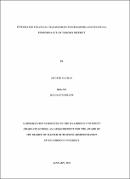| dc.contributor.author | Mutebi, Nathan | |
| dc.date.accessioned | 2022-03-17T10:41:18Z | |
| dc.date.available | 2022-03-17T10:41:18Z | |
| dc.date.issued | 2021-01 | |
| dc.identifier.citation | Mutebi,Nathan (2021). Integrated Financial Management System(IFMS) and financial performance of Tororo district.Kyambogo University(Un published work) | en_US |
| dc.identifier.uri | https://kyuspace.kyu.ac.ug/handle/20.500.12504/891 | |
| dc.description | xii,93 p. | en_US |
| dc.description.abstract | This study examined the effect of integrated financial management infom1ation system
IFMIS) on performance of Tororo district local government. The objectives of the study
were: to assess how the application of integrated financial management information systems
(IFMIS) in financial planning has affected the performance of Tororo District Local
Government; to analyze how the use of integrated financial management systems (IFMS) in
budgeting has affected the performance in Tororo District Local Government; to establish
how use of integrated financial management systems (IFMS) in financial repo11ing and
accountability has affected performance of Tororo District Local Government.
The study had a high average response rate of 77 % (r= 175) of the respondents who answered
the questionnaires and key informants interviewed. Only 23 % (nr=52) did not respond to
the questionnaires. The majority of the respondents were aged 36-45 years which represents
56 (31.72%) followed by those between 26-35 years accounted for 54 (30.8~%) and 46-55
years accounting to 39 (22.47%), and 20-25 years accounting to 26 (14.98%) of the
population who responded to the questionnaires and interview guide. The study revealed that
implementation of IFMIS in planning had a positive effect on performance with a regression
coefficient of 0. 769a. This depicts a strong linear effect of IFMIS in planning on
performance. The effect is significant at 0.002. Capacity and training ( 4.58), and the
resistance and acceptance (4.4) of IFMIS adoption both have positive significant effect on
performance with mean values of 3.554 and 3.4122 respectively. This implies that the use of
IFMIS in planning had highly affected the financial performance of Tororo district local
government. From table 4.11 , (96.6%) of the respondents agreed that efficient use of IFMIS
in budgetary management acts as a tool for measuring perfonnance. The model summary
showed that adjusted R2 is 0.5201. This indicated that 0.5201 variance of budgeting is a good
predictor of performance of Tororo district local government. Since adjusted R2 is 0.5201
adoptions of IFMIS in budgeting suggest that there is a moderate effect on financial
performance. Financial reporting and accountability did not have strong effect on performance
with regression coefficient R2 0.172 and adjusted R2 0.156 implying it was not a good
predictor of performance since it only explained a 15.6% variation and other factors contribute
84.4%. | en_US |
| dc.language.iso | en | en_US |
| dc.publisher | Kyambogo University(Un published work) | en_US |
| dc.subject | Integrated Financial Management Systems(IFMS) | en_US |
| dc.subject | Financial performance | en_US |
| dc.subject | Tororo district | en_US |
| dc.title | Integrated Financial Management System(IFMS) and financial performance of Tororo district | en_US |
| dc.type | Thesis | en_US |

